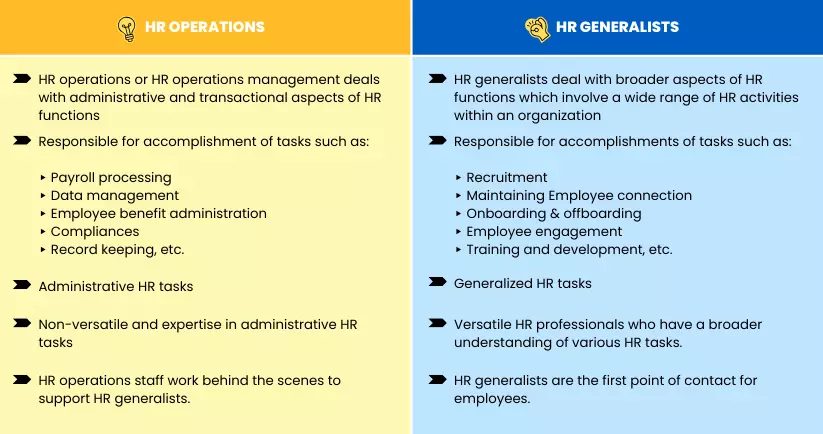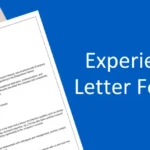What are HR Operations?
HR operations, also called human resources operations or HR procedures is the process of administrating, managing, and coordinating tasks associated with organizational workforce management. HR operations is responsible for business workflow management.
The human resource professionals, known as the HR department or HR team of an organization ensure seamless management of HR operations by adopting the best practices that align with the overall goals of the organization.
HR operations are the main function of handling the broader concept of people’s management efficiently with strategic initiatives, professional focus, and developmental planning that contribute to a sustainable and healthy work environment.
Now that we understand what HR operations are, let us dive into its significance in the human resources realm.
Why is HR Operations an Essential Element of Human Resources?
The significance of HR operations in the realm of human resource management is highly significant for the company as it involves various elements, such as:
- Handling the HR tasks in HR systems seamlessly.
- Management of compliance and adherence to laws, policies, and procedures.
- Mitigation of legal and financial risks that prevail in the business operations.
- Undertaking HR operations involving efficient documentation of employees’ personal data.
- HR procedures contribute to a positive employee experience, hence, boosting their morale to be more productive.
- Generating reports and analytics, which are essential for efficient decision-making.
- Streamlining workforce management that strengthens employee relations and connection with the organization.
HR operations are a part of HR systems which have a significant role in developing business productivity and contributing to a healthy work environment.
Also Read:
HR operations vs. HR generalist
| HR operations | HR generalists |
| HR operations or HR operations management deals with administrative and transactional aspects of HR functions | HR generalists deal with broader aspects of HR functions which involve a wide range of HR activities within an organization |
| Responsible for accomplishment of tasks such as:
▸ Payroll processing |
Responsible for accomplishment of tasks such as:
▸ Recruitment |
| Administrative HR tasks | Generalized HR tasks |
| Non-versatile and expertise in administrative HR tasks | Versatile HR professionals who have a broader understanding of various HR tasks. |
| HR operations staff work behind the scenes to support HR generalists. | HR generalists are the first point of contact for employees. |

Goals of HR Operations Teams
The goals of the HR operations manager and the HR team should be aligned with the overall objective of the organization to ensure the smooth functioning of the workflow processes and contribute to a financially and economically stable and healthy work environment.
A few areas of the HR operations team that should align with organizational interests include the following:
➔ Talent Acquisition
Talent acquisition or attracting the best talent is pivotal for the HR teams and is considered a vital goal as business operations majorly depend on the accomplishments of its workforce.
The performance of employees decides the success of the business in the long run. So, attracting top talent and retaining the prevailing top performers are on top of the list of goal accomplishments for HR operation teams.
➔ Performance Management
Managing the performances of employees is another crucial objective of the HR operations team. Irrespective of a company’s size, the workforce of a company usually consists of diversified individuals with differences in thoughts and culture, which is ultimately reflected in their day-to-day undertakings.
Therefore, the HR team needs to merge the interests of individuals and navigate them towards the achievement of the company’s goals.
➔ Employee Connection
Employee relations and connection with the organization are essential for the retention of the best talents in the organization and for reducing attrition rates.
HR teams work as a bridge between the senior management and the employees; therefore, they need to devise new ways and implement activities that would enhance the employees’ connection with their organization and encourage them to put creative efforts into achieving organizational targets.
➔ Employee Engagement & Retention
Employee retention vastly depends on the employee relations with the organization, which relies on the engagement they have with the company and the HR team.
Implementing best practices for employee engagement, such as arranging Corporate Social Responsibility (CSR) activities, corporate philanthropy activities, etc. will also result in improved engagement and retention.
➔ Workplace Safety and Maintaining Data Security
Workplace safety is essential to keep up with the workforce’s health and to ensure preventive measures in the case of unsafe workplaces that deal with chemicals, other explosives, or other vulnerable products that involve risks in day-to-day tasks.
The human resources department should put it on top of their goal accomplishment list to ensure the workplace safety of their employees and also maintain confidentiality with the documents shared by the employees during onboarding.
➔ Efficiency Enhancement
Enhancing the efficiency of the employees can yield creative outcomes, increased productivity, and elevated retention rates.
The prime focus of HR operations teams should be on enhancing the efficiency of employees by devising different ways, such as providing recognition to deserving employees, rewarding best performers with bonuses, benefits, compensations, and rewards, arranging workshops and training sessions for employees to nourish their skills, gain new knowledge, etc.
➔ Payroll Timeliness
This is one of the most crucial elements that should be accomplished by the HR operations team on time.
Processing payroll on a timely basis helps the HR team to keep up with the payroll records of employees and process them on time to employees, hence increasing their motivation to work and enhancing employee relations with the organization.
➔ Cost Control
Keeping the recruitment, hiring, training, and wage costs in control is one of the primary elements an HR operations team is responsible for.
The HR operation professionals should focus on planning a budget regarding the cost per recruitment and performance to ensure the allocated budget stays within the expected limits.
➔ Resource Management
Another important objective of the HR operations team is to manage the resources that fall under their supervision, such as talent acquisition cost, manage the performance of the organization’s workforce, etc.
Efficient management of resources is not only profitable for the business but also essential for the contingency plan of the company during any unexpected crisis and seismic market drifts.
➔ Maintaining a Positive Work Environment
A healthy work environment is the basic prerequisite for the development and growth of business.
Human resource professionals are responsible for framing, developing, and maintaining policies and procedures that would not only contribute to organizational well-being and employee welfare but also enhance peace and positivity in the workplace atmosphere.
Key Roles & Responsibilities in HR Operations
The key roles and responsibilities of the process of HR operations include:
➔ Administration
The main responsibility of HR operations is to administer the day-to-day operations and contribute to a healthy workplace.
HR operations include evaluation and efficient administration of human resources information, which consists of:
- Documentation of employees
- Payroll administration
- Employee benefits administration
- Employee engagement
- Workplace safety monitoring
- Compliance Maintenance.
➔ Recruitment
In the human resources sphere, recruitment holds the major share of scrutiny as an organizational workflow, as an organization heavily depends on the quality of its workforce.
The employees’ experience in the recruitment process shapes their impression of the company’s culture and ethos, which as a result highlights the company’s reputation in the cut-throat market.
Hence, the recruitment process in HR operations is vital for attracting the best talent along with nurturing the company’s image.
➔ Coordination & Communication
The roles and responsibilities in HR operations also include efficient coordination and communication within the organization.
Coherent communication with employees helps in retaining the best talents and efficient coordination sweeps away confusion which could potentially create conflicts in an organization.
➔ Management
The management of workforce and workflow tops the list in human resources systems and HR operations. HR operations are majorly responsible for directing, controlling, and supervising the company’s welfare, and employees’ safety, and maintaining work decorum.
Management in HR operations include the following:
- Attendance and leave management
- Payroll management
- Employee management, from onboarding to offboarding
- Data management of employees and the company
- Policies and compliance management
- Developing and maintaining workplace ethics and culture.
➔ Compliance
HR operations also include compliance with policies that are framed to protect the interests of both the company and its employees.
Ensuring HR practices comply with the State and Central Governments, as well as Federal laws and regulations is another aspect of HR operations that helps an organization to stay away from legal lawsuits, and internal conflicts.
➔ Support
HR reports and analytics of HR operations, which provide insights into employees’ performance management trends and metrics are also a part of HR operations.
This data further helps in supporting critical decisions to be made in uncertainties and shifts in workflow circumstances.
What does an HR Operations Manager do?
After getting an insight into what is HR operations and what roles are included in it, let’s get to know more about HR operations managers.
An HR operations manager is an individual or a group who is responsible for performing the role of developing and maintaining workplace decorum by adhering to the roles and responsibilities that are inclusive in HR operations such as:
- Employee retention
- Improving employee relations
- Boosting employee productivity
- Cost management
- HR technology adoption
- Balancing administrative responsibilities
- Documentation & data privacy
An HR operations manager is responsible for retaining the best talents in the organization. In addition, decreasing the attrition rate plays a crucial role in HR operations.
Key Takeaways!
In conclusion, HR operations is a pillar in the business workflow that should be aligned with the overall objective of the organization to achieve effectiveness in productivity and growth in business.
As organizations grow globally and become diversified, HR operations are required to evolve accordingly to go along with the alterations and adapt to create inclusive workplaces.
In the present era of technological development, HR professionals need to stay updated with the automation techniques and procedures to process HR operations seamlessly.
HR operations encompass major functions of an organization starting from recruitment, onboarding, and payroll processing to other administrative tasks. Organizational success depends on the efficiency of the HR operations to attract, retain, and develop the skills of the persisting workforce.









